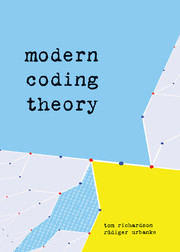Book contents
- Frontmatter
- Contents
- PREFACE
- 1 INTRODUCTION
- 2 FACTOR GRAPHS
- 3 BINARY ERASURE CHANNEL
- 4 BINARY MEMORYLESS SYMMETRIC CHANNELS
- 5 GENERAL CHANNELS
- 6 TURBO CODES
- 7 GENERAL ENSEMBLES
- 8 EXPANDER CODES AND FLIPPING ALGORITHM
- A ENCODING LOW-DENSITY PARITY-CHECK CODES
- B EFFICIENT IMPLEMENTATION OF DENSITY EVOLUTION
- C CONCENTRATION INEQUALITIES
- D FORMAL POWER SUMS
- E CONVEXITY, DEGRADATION, AND STABILITY
- Authors
- Index
1 - INTRODUCTION
Published online by Cambridge University Press: 05 September 2012
- Frontmatter
- Contents
- PREFACE
- 1 INTRODUCTION
- 2 FACTOR GRAPHS
- 3 BINARY ERASURE CHANNEL
- 4 BINARY MEMORYLESS SYMMETRIC CHANNELS
- 5 GENERAL CHANNELS
- 6 TURBO CODES
- 7 GENERAL ENSEMBLES
- 8 EXPANDER CODES AND FLIPPING ALGORITHM
- A ENCODING LOW-DENSITY PARITY-CHECK CODES
- B EFFICIENT IMPLEMENTATION OF DENSITY EVOLUTION
- C CONCENTRATION INEQUALITIES
- D FORMAL POWER SUMS
- E CONVEXITY, DEGRADATION, AND STABILITY
- Authors
- Index
Summary
WHY YOU SHOULD READ THIS BOOK
The technology of communication and computing advanced at a breathtaking pace in the 20th century, especially in the second half. A significant part of this advance in communication began some 60 years ago when Shannon published his seminal paper “A Mathematical Theory of Communication.” In that paper Shannon framed and posed a fundamental question: how can we efficiently and reliably transmit information? Shannon also gave a basic answer: coding can do it. Since that time the problem of finding practical coding schemes that approach the fundamental limits established by Shannon has been at the heart of information theory and communications. Recently, significant advances have taken place that bring us close to answering this question. Perhaps, at least in a practical sense, the question has been answered. This book is about that answer.
The advance came with a fundamental paradigm shift in the area of coding that took place in the early 1990s. In Modern Coding Theory, codes are viewed as large complex systems described by random sparse graphical models, and encoding as well as decoding are accomplished by efficient local algorithms. The local interactions of the codebits are simple but the overall code is nevertheless complex (and so sufficiently powerful to allow reliable communication) because of the large number of interactions. The idea of random codes is in the spirit of Shannon's original formulation. What is new is the sparseness of the description and the local nature of the algorithms.
- Type
- Chapter
- Information
- Modern Coding Theory , pp. 1 - 48Publisher: Cambridge University PressPrint publication year: 2008



